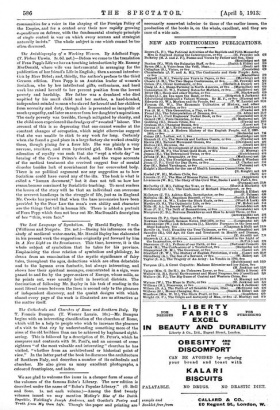The Autobiography of a Working Woman. By Adelheid Popp. (T.
Fisher Unwin. 3s. ent net.)—Before we come to the translation of Frau Popp's Life we haves touching introduction by Mr. Ramsay MacDonald, whose wife n-as instiumental in arranging for tho publication of her friend's Life in English ; then a second introduc- tion by Herr Bebel ; and, thirdly, the author's preface to the third German edition. Frau Popp is an Austrian leader of women's Socialism, who by her intellectual gifts, enthusiasm, and hard work has raised herself to her present position from the lowest poverty and hardship. Her father was a drunkard who died unpitied by his small child and her mother, a hard-headed, independent-minded woman who slaved for herself and her children from necessity and duty. though she is presented as incapable of much sympathy, and later on averse from her daughter's aspirations. The early poverty was terrible, though mitigated by charity, and the child soon experienced the drudgery of" sweated" labour. Tho account of this is so depressing that one cannot wonder at tho constant changes of occupation, which might otherwise suggest that she was unable to stick to any work for long. Certainly when she found a good place in a large factory she worked steadily there, though pining for a freer life. She was plainly a very nervous, sensitive, and even hysterical girL She tolls how her adoration of royalty was such that she "wept a whole day" on hearing of the Crown Prince's death, and the vague accounts of the medical treatment she received suggest fear of mental disorder besides lack of nourishment for her overworked body. There is no political argument nor any suggestion as to how Socialism could have cured any of tho ills. The book is what is called a "human document," but it does not tell us how her reason became convinced by Socialistic teaching. To most readers t he lesson of the story will be that an individual can overcome the severest handicaps in the struggle of life, just as in England Mr. Crooks has proved that when the bare necessaries have been provided by the Poor Law the man's own ability and character are the things that tell in human life. There is added a portrait of Frau Popp which does not bear out Mr. ltfacDonald's description of her "thin, worn face."














































 Previous page
Previous page